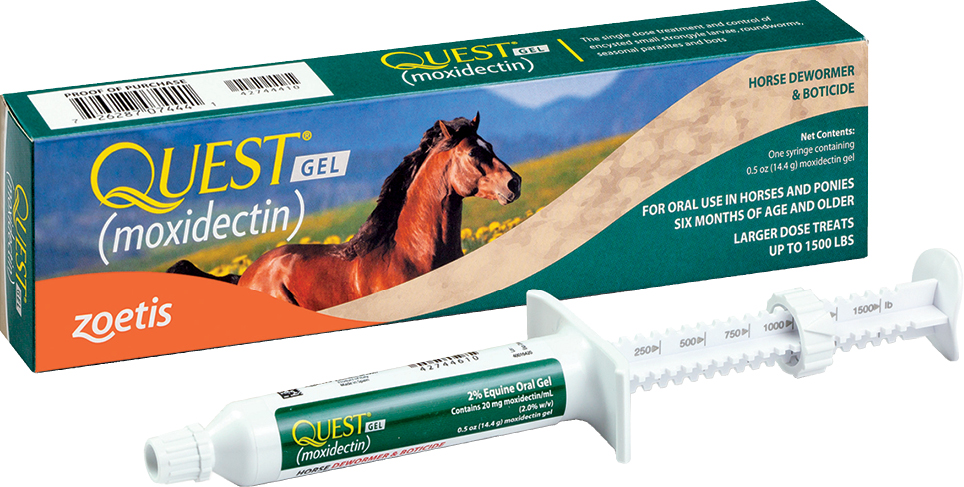How To Treat Summer Sores In Horses
Summer sores are an oozy, itchy, seasonal skin condition caused by the larvae of an equine tummy worm, typically Habronema. Flies are the intermediate host that make summer sores possible; the condition happens when the breadbasket worm's life bicycle is disrupted. Let'southward look at how it works.
The normal life cycle. The developed Habronema worm lives in a horse's stomach, where it may not crusade too much impairment unless in that location's a astringent infestation. The adult worm lays eggs, which pass out and hatch in the equus caballus's manure.
Firm, stable, or confront flies then pick up the stomach worm larvae from the manure and comport them to the horse. If a larva is then deposited on the equus caballus in a place (such as near the rima oris) where the equus caballus inadvertently ingests it, and then that larva returns to the tummy to complete its life cycle and mature into an developed worm.
The disrupted life bike. Larvae that for whatever reason don't find their style into a horse's breadbasket are what cause the summer-sore problem. These larvae may be deposited wherever flies feed—in open wounds or on abraded skin, or in moist places such as mucous membranes, including around the eyes, lips, and sheath.
When they don't get ingested, these larvae cannot mature, so they may drift around in the horse'south tissue instead, causing inflammation and intense itching. The lesions that result often take a greasy appearance or resemble proud mankind, and they resist healing.
Learn More: Summertime Hoof Needs
Treatments. Strategies involve killing the parasite plus calming down the inflammation then the lesions can heal. Ivermectin and moxidectin (run into box) are effective against most stomach worms. For the inflammation, your veterinarian may prescribe topical or systemic glucocorticoids, or a topical mixture of steroids and DMSO.
Excess granulated tissue may also need to be surgically removed or frozen off with liquid nitrogen. Antibiotics may be necessary if a secondary infection has set in.
Without acceptable treatment, summer sores may persist or subside but to return in the next warm season.
Prevention. Fly control is paramount. Without flies as the intermediate hosts, tum-worm larvae can't find their way into your horse's tissues.
Keep manure picked up and properly disposed of or composted away from where horses live. Too remove whatever other fabric—such every bit damp, organic trash—that can serve as breeding areas for flies.
Employ other fly-control methods as well, such as fly predators that feed on fly larvae in manure, or feed-through larvicides that pass through your horse undigested and preclude fly maggots from developing.
Protective horse clothing (masks, sheets, leg coverings) tin can exist an added defense for horses that seem prone to developing summertime sores (some are more susceptible than others).
Likewise work with your vet to establish a deworming regimen that includes periodic apply of ivermectin or moxidectin products while avoiding the overuse that can lead to resistance.
Buy Quest on Amazon!
Products we characteristic have been selected by our editorial staff. If you make a purchase using the links included, we may earn a commission. For more information click here.

Whack the Worms
For treatment and control of the breadbasket worms whose larvae tin lead to summer sores, administer a dewormer containing ivermectin or moxidectin (as at right) according to your veterinarian'southward communication.
Source: https://horseandrider.com/horse-health-care/summer-sores-in-horses/

0 Response to "How To Treat Summer Sores In Horses"
Post a Comment